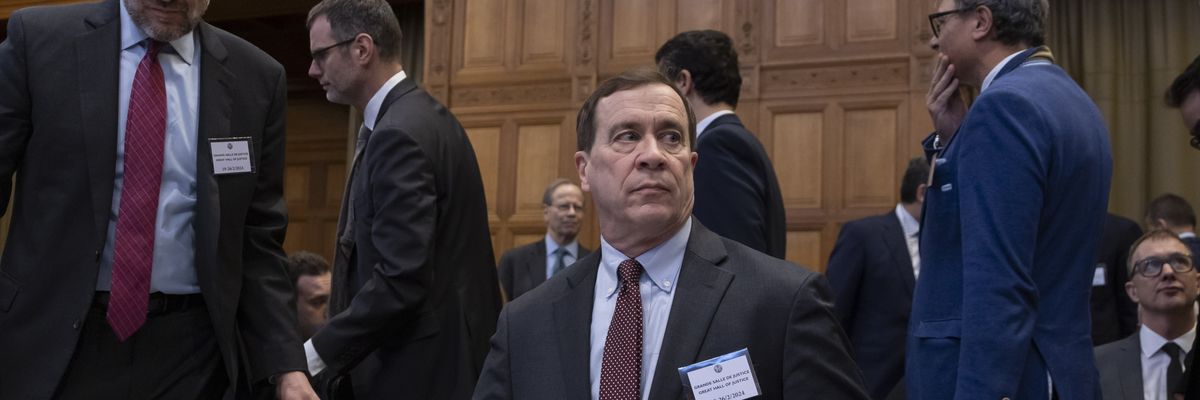
Richard Visek, acting legal adviser for the U.S. State Department, attends an International Court of Justice hearing on the legality of Israel's occupation of Palestinian territory on February 21, 2024 in The Hague, Netherlands.
US Plays Defense for Israeli Occupation at International Court of Justice
A Cuban diplomat, meanwhile, slammed "those who for years have supported each and every one of the policies and practices of Israel, which denied the existence of the Palestinian people and their rights."
An attorney from the U.S. State Department told the International Court of Justice on Wednesday that it should not put its weight behind global calls for Israel to withdraw its forces from the occupied Palestinian territories.
Richard Visek, the U.S. State Department's acting legal adviser, argued that "it would not, as some participants suggest, be conducive to the achievement" of lasting peace for the United Nations' highest court to "issue an opinion that calls for the unilateral, immediate, and unconditional withdrawal that does not account for Israel's security needs."
"The court should not find that Israel is legally obligated to immediately and unconditionally withdraw from occupied territory," said the U.S. representative.
Visek reiterated the Biden administration's stated support for a two-state solution but rejected the argument—made by other nations before the International Court of Justice (ICJ)—that an end to Israel's illegal, decadeslong occupation of Gaza, the West Bank, and East Jerusalem is a necessary prerequisite to securing peace and a durable political solution.
"International law does not impose specific time limits on an occupation," Visek said Wednesday.
The U.S. presentation came two days after Paul Reichler, an American lawyer representing Palestine during the ICJ proceedings on Israel's occupation, said that "occupation can only be a temporary state of affairs" and criticized the U.S. government for defending "whatever offenses against international law Israel commits."
"A permanent occupation is a legal oxymoron," said Reichler. "What makes Israel's ongoing occupation of the Palestinian territory unlawful is precisely its permanent character."
Among nations participating in the ICJ proceedings on Israel's occupation, only the U.S. and Fiji are urging the court not to issue an opinion that declares the nearly six-decade occupation of Palestinian territory illegal.
Israel has opted not to take part in the hearings, with far-right Prime Minister Benjamin Netanyahu denouncing them as illegitimate.
The hearings come more than a year after the U.N. General Assembly requested a nonbinding opinion from the ICJ on the "legal consequences" of Israel's open-ended occupation of Palestinian territory. Just last month, the ICJ ruled that Israel's ongoing assault on the Gaza Strip plausibly amounts to genocide—a characterization that the U.S. and other Israeli allies have rejected.
Speaking just before Visek on Wednesday, representatives of Colombia, Cuba, and Egypt condemned the Israeli occupation and implored the ICJ to act decisively.
“The situation that is taking place in the eyes of all confirms the ongoing genocide. Innocent victims—girls, boys, women—number in the thousands," Cuban diplomat Anayansi Rodriguez Camejo said Wednesday, slamming "those who for years have supported each and every one of the policies and practices of Israel, which denied the existence of the Palestinian people and their rights."
"Taken in total," she said, "the unbearable situation of the Palestinian people the honorable International Court of Justice should take a stand in the clearest, strongest, and most forceful legal terms in support of international law."
An Urgent Message From Our Co-Founder
Dear Common Dreams reader, The U.S. is on a fast track to authoritarianism like nothing I've ever seen. Meanwhile, corporate news outlets are utterly capitulating to Trump, twisting their coverage to avoid drawing his ire while lining up to stuff cash in his pockets. That's why I believe that Common Dreams is doing the best and most consequential reporting that we've ever done. Our small but mighty team is a progressive reporting powerhouse, covering the news every day that the corporate media never will. Our mission has always been simple: To inform. To inspire. And to ignite change for the common good. Now here's the key piece that I want all our readers to understand: None of this would be possible without your financial support. That's not just some fundraising cliche. It's the absolute and literal truth. We don't accept corporate advertising and never will. We don't have a paywall because we don't think people should be blocked from critical news based on their ability to pay. Everything we do is funded by the donations of readers like you. Will you donate now to help power the nonprofit, independent reporting of Common Dreams? Thank you for being a vital member of our community. Together, we can keep independent journalism alive when it’s needed most. - Craig Brown, Co-founder |
An attorney from the U.S. State Department told the International Court of Justice on Wednesday that it should not put its weight behind global calls for Israel to withdraw its forces from the occupied Palestinian territories.
Richard Visek, the U.S. State Department's acting legal adviser, argued that "it would not, as some participants suggest, be conducive to the achievement" of lasting peace for the United Nations' highest court to "issue an opinion that calls for the unilateral, immediate, and unconditional withdrawal that does not account for Israel's security needs."
"The court should not find that Israel is legally obligated to immediately and unconditionally withdraw from occupied territory," said the U.S. representative.
Visek reiterated the Biden administration's stated support for a two-state solution but rejected the argument—made by other nations before the International Court of Justice (ICJ)—that an end to Israel's illegal, decadeslong occupation of Gaza, the West Bank, and East Jerusalem is a necessary prerequisite to securing peace and a durable political solution.
"International law does not impose specific time limits on an occupation," Visek said Wednesday.
The U.S. presentation came two days after Paul Reichler, an American lawyer representing Palestine during the ICJ proceedings on Israel's occupation, said that "occupation can only be a temporary state of affairs" and criticized the U.S. government for defending "whatever offenses against international law Israel commits."
"A permanent occupation is a legal oxymoron," said Reichler. "What makes Israel's ongoing occupation of the Palestinian territory unlawful is precisely its permanent character."
Among nations participating in the ICJ proceedings on Israel's occupation, only the U.S. and Fiji are urging the court not to issue an opinion that declares the nearly six-decade occupation of Palestinian territory illegal.
Israel has opted not to take part in the hearings, with far-right Prime Minister Benjamin Netanyahu denouncing them as illegitimate.
The hearings come more than a year after the U.N. General Assembly requested a nonbinding opinion from the ICJ on the "legal consequences" of Israel's open-ended occupation of Palestinian territory. Just last month, the ICJ ruled that Israel's ongoing assault on the Gaza Strip plausibly amounts to genocide—a characterization that the U.S. and other Israeli allies have rejected.
Speaking just before Visek on Wednesday, representatives of Colombia, Cuba, and Egypt condemned the Israeli occupation and implored the ICJ to act decisively.
“The situation that is taking place in the eyes of all confirms the ongoing genocide. Innocent victims—girls, boys, women—number in the thousands," Cuban diplomat Anayansi Rodriguez Camejo said Wednesday, slamming "those who for years have supported each and every one of the policies and practices of Israel, which denied the existence of the Palestinian people and their rights."
"Taken in total," she said, "the unbearable situation of the Palestinian people the honorable International Court of Justice should take a stand in the clearest, strongest, and most forceful legal terms in support of international law."
An attorney from the U.S. State Department told the International Court of Justice on Wednesday that it should not put its weight behind global calls for Israel to withdraw its forces from the occupied Palestinian territories.
Richard Visek, the U.S. State Department's acting legal adviser, argued that "it would not, as some participants suggest, be conducive to the achievement" of lasting peace for the United Nations' highest court to "issue an opinion that calls for the unilateral, immediate, and unconditional withdrawal that does not account for Israel's security needs."
"The court should not find that Israel is legally obligated to immediately and unconditionally withdraw from occupied territory," said the U.S. representative.
Visek reiterated the Biden administration's stated support for a two-state solution but rejected the argument—made by other nations before the International Court of Justice (ICJ)—that an end to Israel's illegal, decadeslong occupation of Gaza, the West Bank, and East Jerusalem is a necessary prerequisite to securing peace and a durable political solution.
"International law does not impose specific time limits on an occupation," Visek said Wednesday.
The U.S. presentation came two days after Paul Reichler, an American lawyer representing Palestine during the ICJ proceedings on Israel's occupation, said that "occupation can only be a temporary state of affairs" and criticized the U.S. government for defending "whatever offenses against international law Israel commits."
"A permanent occupation is a legal oxymoron," said Reichler. "What makes Israel's ongoing occupation of the Palestinian territory unlawful is precisely its permanent character."
Among nations participating in the ICJ proceedings on Israel's occupation, only the U.S. and Fiji are urging the court not to issue an opinion that declares the nearly six-decade occupation of Palestinian territory illegal.
Israel has opted not to take part in the hearings, with far-right Prime Minister Benjamin Netanyahu denouncing them as illegitimate.
The hearings come more than a year after the U.N. General Assembly requested a nonbinding opinion from the ICJ on the "legal consequences" of Israel's open-ended occupation of Palestinian territory. Just last month, the ICJ ruled that Israel's ongoing assault on the Gaza Strip plausibly amounts to genocide—a characterization that the U.S. and other Israeli allies have rejected.
Speaking just before Visek on Wednesday, representatives of Colombia, Cuba, and Egypt condemned the Israeli occupation and implored the ICJ to act decisively.
“The situation that is taking place in the eyes of all confirms the ongoing genocide. Innocent victims—girls, boys, women—number in the thousands," Cuban diplomat Anayansi Rodriguez Camejo said Wednesday, slamming "those who for years have supported each and every one of the policies and practices of Israel, which denied the existence of the Palestinian people and their rights."
"Taken in total," she said, "the unbearable situation of the Palestinian people the honorable International Court of Justice should take a stand in the clearest, strongest, and most forceful legal terms in support of international law."

